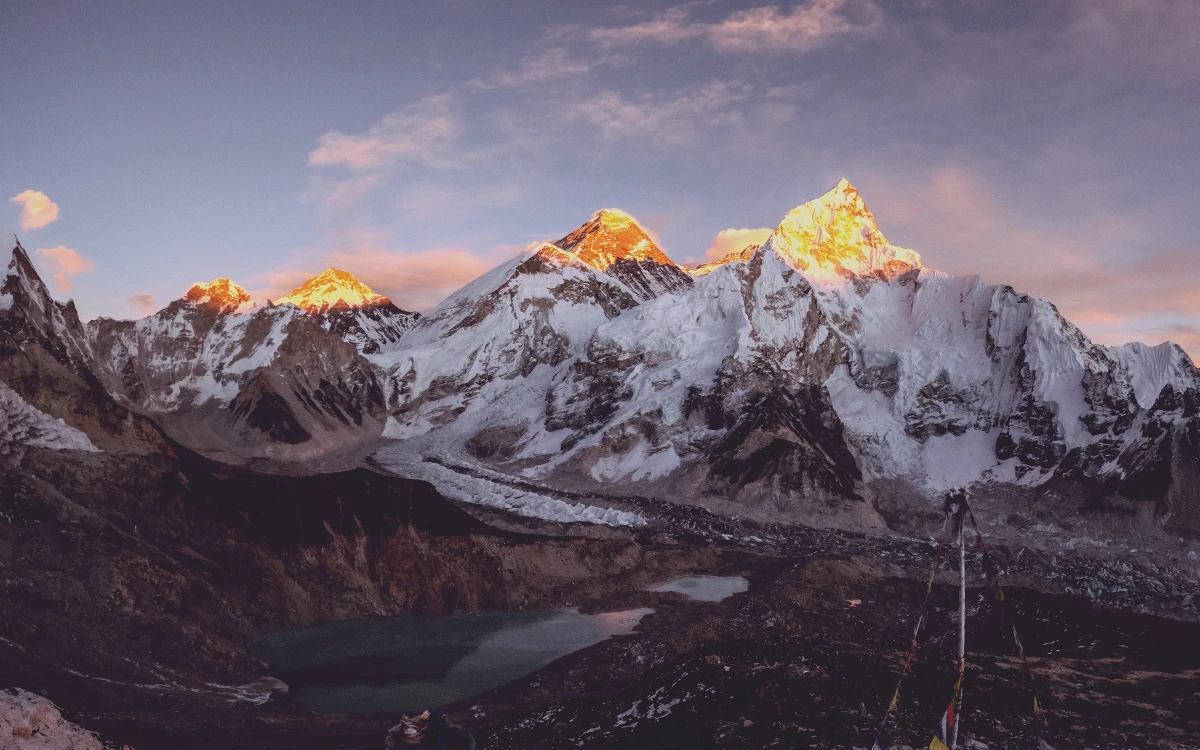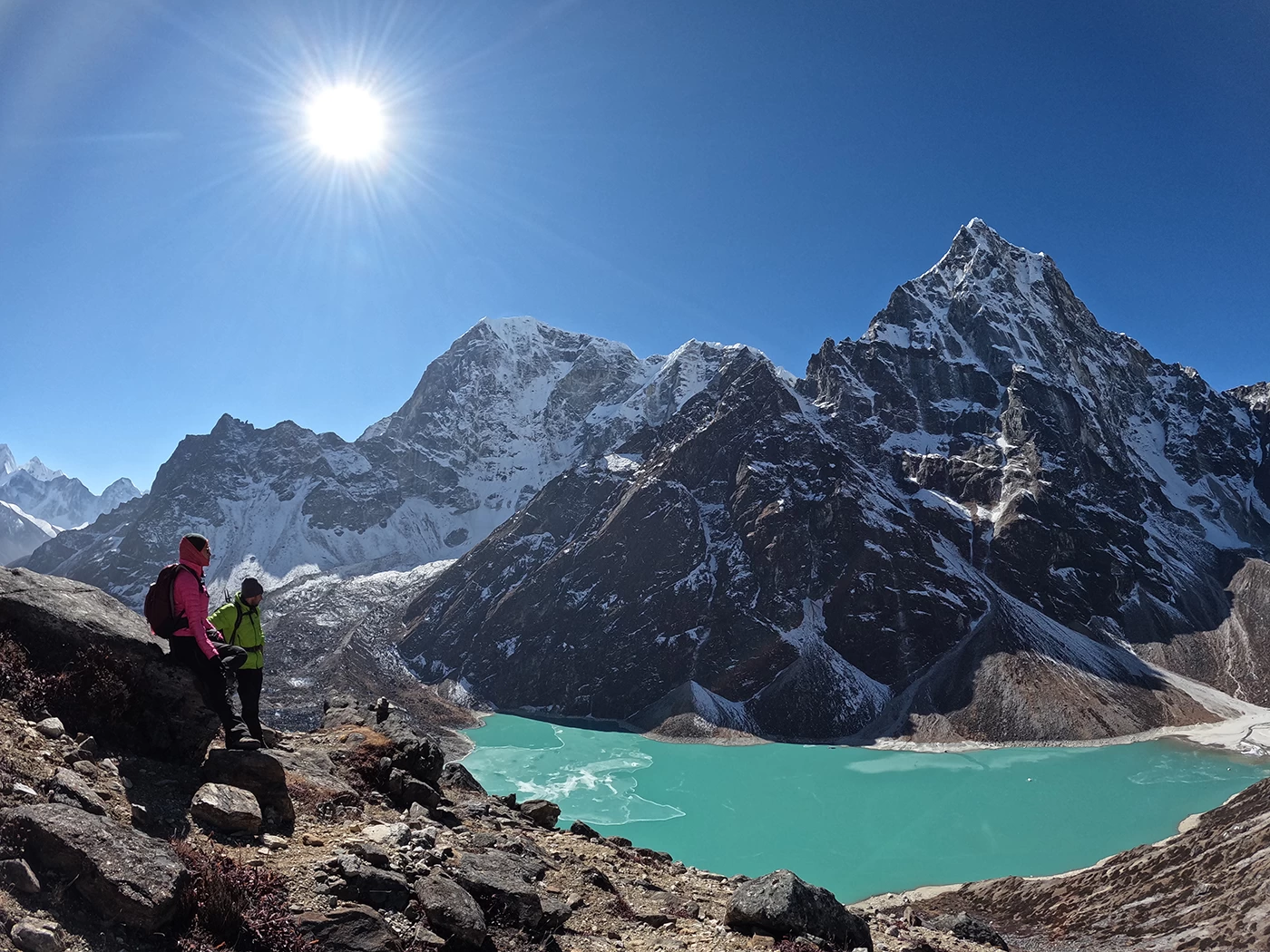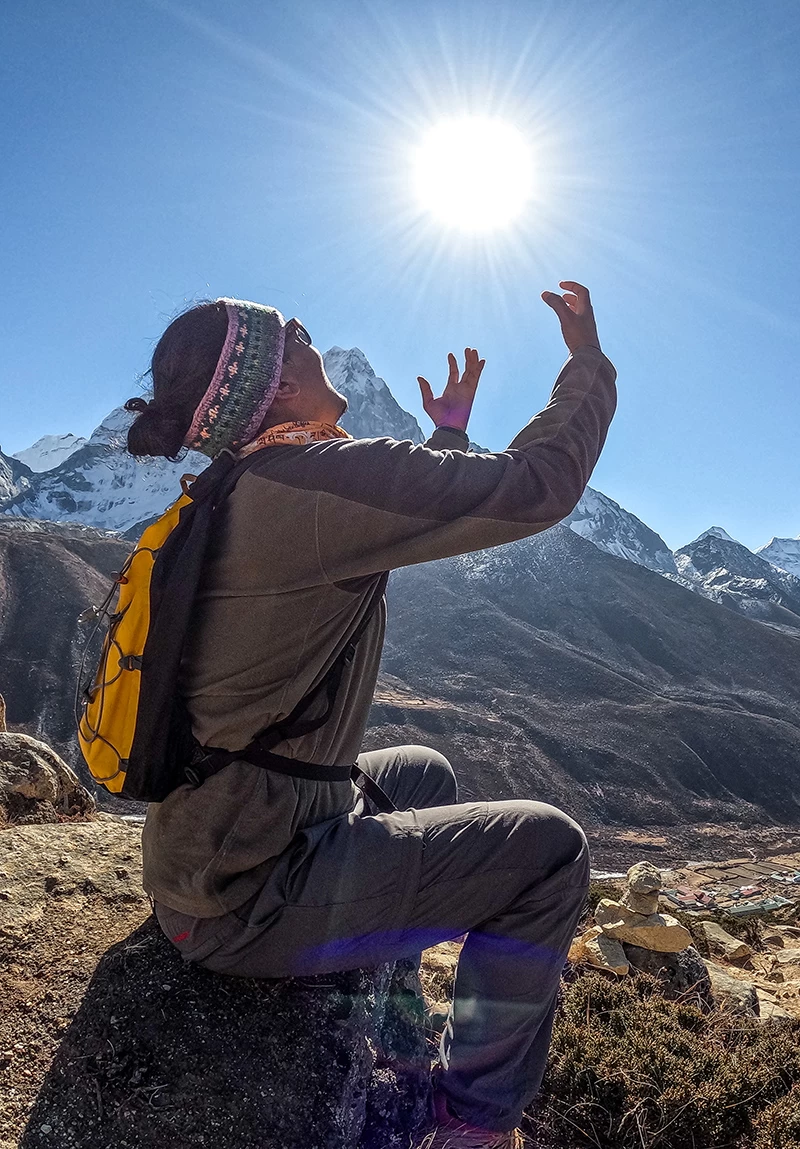

The Everest High Pass Trek is an exhilarating adventure that challenges trekkers with the three iconic high passes of the Everest region: Kongma La Pass (5,540m), Cho La Pass (5,335m), and the newly explored Renjo La Pass (5,400m). Ideal for ambitious trekkers, this route offers the thrill of crossing high-altitude passes without requiring technical climbing skills. As you navigate these passes, you’ll be rewarded with spectacular views of towering peaks like Mount Everest (8,848m), Cho Oyu (the world’s sixth-highest mountain), Makalu, Ama Dablam, Lhotse, and more. The trek also offers breathtaking vistas of glaciers such as Ngozumpa and Khumbu, as well as panoramic views of the Gokyo Valley and its stunning turquoise lakes. Additionally, the journey allows you to immerse yourself in the rich culture and lifestyle of the Sherpa people, who are renowned worldwide for their mountaineering prowess.
Starting with a scenic flight from Kathmandu to Lukla, the Everest High Pass Trek takes you through the heart of the Himalayas, following the Dudh Koshi River Valley. As you trek, you’ll pass through lush forests of rhododendron and pine, traverse the Sagarmatha National Park, and visit picturesque Sherpa villages like Phakding, Namche Bazaar, and Tengboche. The journey is filled with unforgettable sights, including terraced farms, cascading waterfalls, and the majestic Himalayan panorama. Along the way, you’ll also have the opportunity to explore the UNESCO-listed Sagarmatha National Park, home to diverse flora and fauna, including the elusive snow leopard, red panda, and Himalayan tahr. The warm hospitality of the Sherpa people and the vibrant culture of the region will leave a lasting impression.
This trek program is designed with a strong focus on acclimatization, offering a comfortable pace with strategically placed stops to ensure your safety and well-being. If you're physically fit and have experience with multi-day treks, and you're seeking a challenging high-altitude adventure, then the Everest High Trek is highly recommended for an unforgettable Himalayan experience! Expect to walk an average of 5 to 7 hours per day. You’ll only need to carry a daypack, as porters will manage the rest of your gear.
The best time to trek to Everest High Pass Trek is during the spring (March-May) or autumn (September-November) seasons. These periods offer stable weather, clear skies, and minimal rainfall, providing optimal conditions for trekking. However, remember that these are peak seasons, so expect more crowds and higher prices.
Three Iconic High Passes: Experience the thrill of crossing Kongma La, Cho La, and Renjo La passes, each offering stunning panoramic views of Everest, Lhotse, Makalu, and other towering peaks.
Breathtaking Glacial Lakes and Valleys: Marvel at the turquoise beauty of Gokyo Lakes and the vast expanse of Ngozumpa Glacier, the largest in the Himalayas, set against a backdrop of dramatic mountain landscapes.
Cultural Immersion in Sherpa Villages: Explore traditional Sherpa villages like Namche Bazaar and Tengboche, where you can experience the unique culture, spirituality, and hospitality of the local people.
Unparalleled Mountain Vistas: Enjoy close-up views of some of the world’s highest peaks, including Mount Everest (8,848m), Cho Oyu, and Ama Dablam, from various vantage points throughout the trek.
Sagarmatha National Park: Trek through the UNESCO-listed Sagarmatha National Park, home to diverse flora and fauna, including the rare snow leopard and red panda, amidst the awe-inspiring Himalayan scenery.
|
|
|
|---|


| Departure | Return | Duration | Price From |
|---|
Please complete the form to submit your application.
Step 1: Tell us about yourself.
Fill out the Booking Form with as much information as possible.
Step 2: Pay 30% of your deposit.
Once the deposit has been paid, you have secured your position.
Step 3: Get excited and start preparing. You will receive regular contact about your upcoming trip and how to prepare.
Hotel in Kathmandu: In Kathmandu, we offer the best hotel with standard twin-bed rooms, including breakfast.
Mountain Lodge: The Everest Base Camp Trek offers basic lodge accommodations with twin beds, mattresses, and blankets. Most lodges have dining halls heated with yak dung and a restaurant. For added warmth, recommend bringing your own sleeping bag and liner. Rooms may not have charging ports or attached toilets. Meals are typically provided at the lodge where you stay.
Sharing Rooms: Rooms are typically shared with one other person. Solo travellers can be paired with a same-gender roommate, while those travelling with others can share a room. You can request separate arrangements, with single rooms available for an extra fee.
Battery Charging: Charging stations are typically located in the lodge's dining area, with fees ranging from USD 1-3 per hour, depending on the device. Charging power banks usually incur a higher fee. Many lodges use solar panels for power, which may be unreliable during bad weather. A portable battery charger (15,000-20,000mAh) is recommended to ensure you have enough power for multiple charges.
Cellular Network: Consider an international calling plan from your home provider for reliable service. If you prefer a Nepali SIM card, Nepal Telecom (NTC) generally offers better coverage in remote areas compared to Ncell, though reception may still be limited in some places. SIM cards cost $1-2 and can be purchased in Kathmandu. You'll need to provide a passport copy and a passport-sized photo for their records. A 10GB data pack, costing $5-10, should be sufficient for 1-2 weeks, depending on your data usage.
Wi-Fi: You can purchase Wi-Fi each night from teahouses for $5-10. They offer plans with unlimited access for 12 hours or 24 hours. However, internet speeds can be slow and patchy in remote areas.
Hot Showers: Hot showers (solar or gas) are available for a fee of 4-7 US $ per shower. Above 4,000 meters, only bucket showers are provided.
Toilets: Shared toilets are common, with options ranging from Western to squat styles. Attached toilets are rare at higher elevations, and running water may not be available. Bring your toilet paper and soap.
Mountain Flights: Mountain flights operate exclusively in the mornings, offering a thrilling and picturesque experience. These flights use Twin Otter planes, which can accommodate approximately 18 passengers. Common carriers include Summit Air, Tara Air, and Sita Air.
Vehicle: We provide reserved private vehicles for all your transportation needs, including pick-ups and drop-offs according to the itinerary. The type of vehicle-whether a car, jeep, or will be chosen based on the number of passengers and the terrain.
Food: Lunch and dinner are not included in the price, giving you full flexibility to choose meals based on your appetite and preferences. The lodges offer a decent selection of food and drink options. For vegetarians, vegans, or those with dietary restrictions, please let us know at the time of booking so we can make appropriate arrangements.
Water: Carrying your own water bottle or hydration pack is mandatory. It's recommended to have a bottle (1.5-2 litres) and a thermal flask (1 litre or smaller) during the trek. You can refill your bottle with boiled or bottled drinking water available at lunch spots and hotels. We strongly discourage buying plastic water bottles during the trek to minimize environmental impact.
Snacks: It's recommended to bring snacks (like chocolates, dry fruits, etc.) and energy bars to munch on during the trek.
Shops Along the Way: You'll encounter several well-stocked shops along the trails (especially in the lower elevations) where you can purchase water, snacks, and toiletries. There are also shops selling tea and beverages between lunch stops.
Our team consists of experienced and reliable tour leaders, guides, trek leaders, climbing leaders, and porters who are used to living in high altitudes.
We are committed to providing our clients with the best possible Himalayan experience. Our team is dedicated to your safety and enjoyment, and we will do everything we can to make your trek a success.
Additional Expenses: Beyond meals, potential expenses include drinks, laundry, tipping, and shopping. Please review the "Prices" section carefully to understand additional costs you may encounter during your trip.
Emergency Fund: While our trips are meticulously planned, unforeseen circumstances (like political unrest, strikes, bad weather, natural calamities, poor road conditions, airport closures, flight cancellations, etc.) can arise. For this reason, we recommend setting aside Rs. 25,000 as an emergency fund.
Currency: It's advisable to carry Nepali rupees for the trials, as most service providers transact in this currency.
ATMs and Credit Cards: Cash is the preferred payment method in most areas outside major cities. While some hotels and eateries in popular towns accept cards, reliability can be an issue. Card transactions may incur a 3-4% transaction fee. ATMs are limited in smaller towns, so carrying sufficient cash is recommended.
Tipping: Most hotels and eateries include a service charge with tips in their bills. You're encouraged to tip the trekking crew if you're satisfied with their service. A suggested guideline is USD 12-15 per day for guides and USD 7-10 per day for porters. Feel free to tip more if you're particularly pleased. Tips can be given in Nepali rupees or US dollars. Typically, the group pools money together to tip guides and porters on the final day of the trek during dinner.
Cancellations and Refunds: In case of flight delays or cancellations due to bad weather or unforeseen circumstances, we'll reschedule at no extra cost. However, any additional expenses incurred due to changes (including transportation, accommodation, and food) will be the trekker's responsibility.
Altitude Sickness: We take altitude sickness seriously and design our itineraries for a gradual ascent, covering shorter distances at higher elevations. To acclimatize, we stay an extra night at the same location or similar altitude after significant elevation gains.
During the trek, we prioritize hydration, avoid alcohol, and conduct acclimatization hikes as needed. Our guide will monitor your vitals with an oximeter daily to assess your body's response to altitude changes. If you experience AMS symptoms or headaches, please inform your guide immediately. Mild headaches can often be managed with food, hydration, and rest. While we generally don't recommend Diamox (altitude sickness pills), you may consider taking them as a precaution if you're coming from sea level.
Trail Safety: Our guide carries a well-equipped first-aid kit at all times. Please review our equipment and medical checklist for better preparedness, as common issues like foot blisters and knee pain can be addressed with proper packing. If you have pre-existing health conditions, please inform us upon booking.
Keep your passport, flight tickets, phone, wallet, camera equipment, cash, and valuables in your daypack or waist belt. Avoid bringing expensive items like jewellery or large amounts of cash for security reasons.
Insurance: Obtaining travel insurance that covers emergency evacuation (including helicopter rescue) and medical expenses up to 5,500 meters (18,044 feet) above sea level is mandatory.
Drinking Water: Water safety is paramount. To avoid waterborne diseases, we recommend drinking only boiled water or using steriPEN, LifeStraw, or purification tablets during the trek.
Immunization: Recommended immunizations before trekking in Nepal include Hepatitis A, Typhoid fever, and chickenpox. While not strictly enforced, they are for your safety.
Emergency Contacts: In case of issues or emergencies, please contact the lead guide or any team member. They can assist with contacting nearby hospitals, transportation, ambulances, police offices, army checkpoints, and embassies, and facilitate rescue operations. We'll provide a list of relevant emergency contacts before your trip.
What to Pack: Kathmandu offers many gear shops where you can purchase or rent essential items. If you forget anything, Thamel is a convenient place to buy it before your trek. You can rent items like a sleeping bag for around USD 2-3 per day.
What Not to Carry: At the airport, items such as oxygen cylinders, drones, satellite phones (without permission), and sharp objects like knives and scissors may be confiscated.
Check the Trekking Checklist here..
Leave No Trace: Please avoid littering and dispose of all trash properly; you can hand it to your guide. Refrain from plucking flowers or vandalizing trails. Let's keep the trails as pristine as we found them.
Rules and Conduct: Physical violence, verbal abuse, harassment, solicitation, and the use or possession of illegal drugs or materials are strictly forbidden.
Alcohol and Drugs Policy: Excessive alcohol consumption can dehydrate you and affect your trekking safety. We advise limiting alcohol intake during the day and saving any drinks for the evening.
No Handouts: Do not give money or handouts to beggars or children, as it encourages a culture of begging.
Photography and Drones: Always ask for permission before photographing locals, though many are happy to be photographed. Note that drone usage is strictly regulated in Nepal, so please avoid flying drones.
Traveling in a Group: Group travel offers a mix of ages, fitness levels, and paces. Please respect the schedule set by your guide to ensure a smooth experience for everyone.
Passport: All foreign visitors to Nepal must possess a valid passport with a minimum of 6 months validity beyond their planned departure date.
Visa: Nepal visa can be obtained on arrival at Kathmandu airport (Tribhuvan International Airport) or you can obtain Nepal visa prior to your arrival through the Nepalese embassies, diplomatic missions and consulates near your location. Nepal Visa is also issued at the entry points if you are entering Nepal by land.
Visa Fees: Nepal visa fees are listed below as per the duration.
Important Note: It is always advisable to verify the visa requirements upon booking your trip. Visa requirements may vary depending on where you are from and its also recommended to check the transit country requirements as well.
While we share this information in good faith, it is crucial for you to independently verify it and acknowledge that you bear full responsibility for your visa requirements.
(No Reviews)
Write Your Review
Give Review